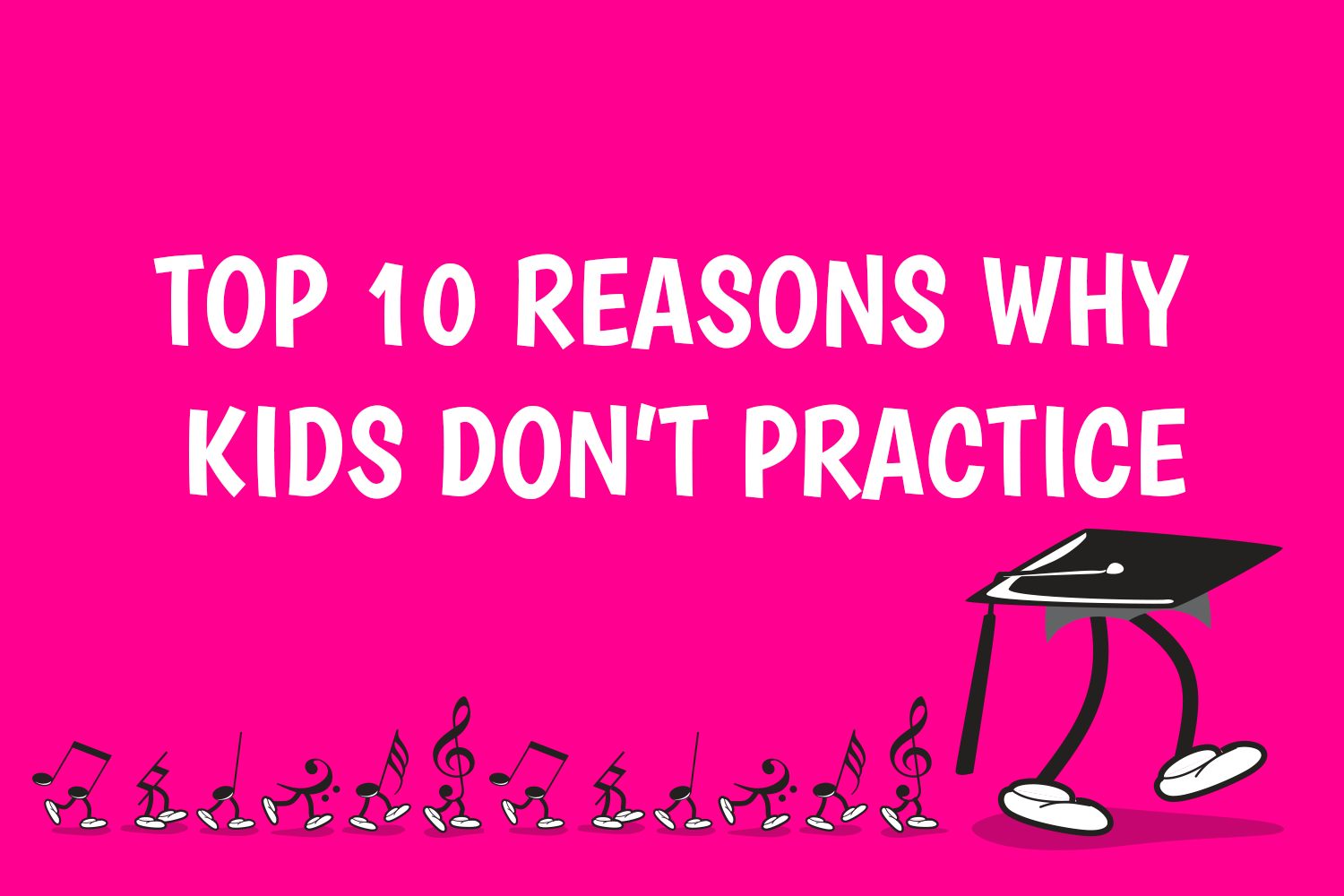Top 10 Reasons Why Kids Don’t Practice

If your child loves to practice, and never has to be reminded, ordered or bribed to do it, then that is wonderful. However, you are in the VAST MINORITY. Most children will baulk at practice, and below are the top 10 reasons why.
1. No routine
If a child senses that practising is optional, most times they will opt out. Most would do the same with bathing and brushing teeth. Practice, just like personal hygiene, needs to be timetabled in, so that it is a normal part of the daily/weekly routine. If you wait for the magical time when your child ‘feels like’ practising, you might be waiting a very long time.*
Music practice works best when it is done a minimum of four times per week. It’s very much like physical training: just as an athlete needs to train each day, and wouldn’t cram the whole week’s training into one day, so musicians need to practice several times a week (and not, as many students would believe, only on the morning of the lesson J) in order to improve.
*Like, forever.
2. No Availability
Kids these days are typically over-scheduled. Trying to squeeze practice in here and there will usually result in the practice being the first thing to go in a very busy week.
A really useful thing to do is to sit down with your child and write down his/her weekly timetable. Then decide which days and times the practice will take place. (Deciding on this together will greatly increase the chances that the routine will be followed!) There should be AT LEAST three or four opportunities during the week to do some practice. If your child’s week is so full of extra-curricular activities that finding this time is problematic, progress on the instrument will be slow and will eventually erode the motivation to practice at all.
3. Too isolated
If the instrument is tucked away in a room at the back of the house so that the noise won’t disturb anyone, this will make practice a very solitary and unappealing activity for the child. Practising in the bedroom can also be isolating and can be a deterrent to practice – often there are too many tempting distractions in the bedroom. The best location for practice to take place is in a family room, or near the kitchen, where there tends to be a hub of activity and where a parent can keep track of what is (and is not) being done.
4. Inadequate instrument
If the instrument doesn’t sound good, or is difficult to play due to stiff keys or sticking valves, it can be a real de-motivator for practice. If you are hiring a band instrument make sure it is in very good working order. For pianists, a small electronic keyboard may work fine for the first few months of learning piano but after a while it will be fairly limiting in what it can produce, and the child may be less enthusiastic to practise on it. Another thing to consider is that small keyboards do not usually have weighted keys and this is not great for learning piano technique.
The difficulty for parents in this situation is that the child appears to have lost interest, so why invest in another instrument… but often it is exactly that investment that will re-ignite the child’s enthusiasm!
5. No goals
For most children, there needs to be some point to practising. Whereas adults get a lot of intrinsic value from working hard and achieving something, children actually need EXTRINSIC value – that is, doing well in a performance or exam, receiving praise from an adult, or even just learning a certain amount of pieces per term and earning a tick on a chart for each.
Whilst music exams can be great goals to focus on, they don’t necessarily suit every child, and can sometimes end up being a very stressful experience. A concert for family and friends is often the best and most enjoyable goal for children to work towards. Inviting the rellies over for afternoon tea and playing a few pieces for them is a wonderful way to spend a Sunday afternoon.
6. Don’t see the relevance
This point is particularly in relation to playing SCALES. Children will often resist, avoid or procrastinate when it comes to playing scales, citing them as ‘boring’. It’s much more exciting to play pieces, of course. However, playing scales develops technique, and a better technique results in better sounding pieces.
At this point I must mention the ScaleBlitzer app. It really does solve this problem. Really.
7. No Structure
Practising means getting a piece to sound better at the end of the practice than it did at the beginning. Simply playing a piece through from beginning to end does not necessarily improve the way it sounds. Most children need to be taught how to practice – it’s not a skill that comes naturally. The teacher is the best person to give tips on this, but here are some useful practise strategies to get you going:
· Start with the hardest or newest pieces. Leave the more familiar pieces until the end.
· When fixing a certain passage, get it right 3 times IN A ROW before moving on.
· When attempting something hands together for the first time, try it at about half the speed you can do it hands separately.
8. Too hard or too easy
It’s important to listen to the ‘reasons’ being cited by your child when they’re feeling negative about practice. If you start to hear excuses such as ‘I don’t like those pieces’ or ‘Music is boring’, this can be a sign that the level of the pieces set by the teacher is not quite right.
Kids’ avoidance techniques kick in when they don’t feel comfortable with the task at hand. If the pieces are too challenging, progress might be very slow (despite a good practice routine) and there is less incentive to keep at it. If the pieces are too easy, there is less satisfaction for the child
9. Not experiencing improvement
We all like to see the fruits of our efforts. We tend not to stick at something if there’s no improvement. For children especially, the improvement needs to be at a decent rate, otherwise they will love motivation.
Communicate with your teacher if you feel your child might be avoiding practice because of lack of improvement. Every child has a different temperament and you are the best person to help the teacher understand exactly what motivates your child the best.
10. And last but not least… No support
I have had countless adults say to me “I wish my parents hadn’t let me give up piano”. I have never heard anyone say, “I’m sad I can still play piano, it’s so annoying” .
Many parents despair that their children won’t practice and therefore think what a shame it is that they simply don’t want to learn an instrument. This is NOT TRUE. Most children will baulk at practice when the time comes around, but it just takes a little cajoling from the parents and the practice session usually goes just fine. When the parent is supportive and encouraging, practice becomes a normal part of the week and as a result much improvement, achievement and musical joy is experienced.
In conclusion: Don’t mistake a child who doesn’t want to practice for a child who doesn’t want to play a musical instrument. There is much joy to be had from learning to play, and it is up to the parents to see the ‘big picture’ and support children when they are feeling negative about practice.

You’ve nailed it in one (or ten) Samantha!
I love this!
This is spot on! Thank you Samantha.
Nailed it once again Sam! A great article to share with parents who have are having trouble with getting their child to practice. Thank you!
Thanks Michela! 🙂